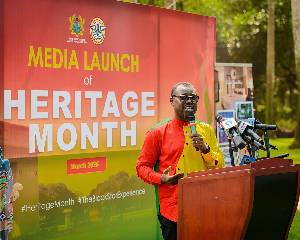The History and Cultural Significance
March is Ghana Month, a time when Ghanaians proudly celebrate their history, culture, and independence. But why is this month so important? The answer lies in Ghana’s fight for independence and the rich cultural traditions that define the nation.
Why Is March Celebrated as Ghana Month?
March is a month in Ghana, and its significance is rooted in the country's Independence Day, celebrated on March 6 every year. On this historic day in 1957, Ghana became the first sub-Saharan African nation to gain independence from British colonial rule, thanks to the leadership of Dr. Kwame Nkrumah and other freedom fighters.
Because of this, March has evolved into a period of national pride, cultural revival, and historical reflection. Schools, businesses, and media houses promote Ghanaian heritage, fashion, food, and traditions throughout the month.
How Ghanaians Celebrate Ghana Month
1. Wearing Traditional Ghanaian Attire
One of the most visible ways Ghanaians celebrate this month is by wearing traditional clothing like:
- Kente (woven fabric worn during special occasions)
- Batakari (Fugu/Smock), mostly worn by people from northern Ghana
- African prints with vibrant designs
2. Promoting Ghanaian Food
Local dishes take centre stage in March, as Ghanaians embrace and promote their authentic cuisine. Popular foods include:
- Waakye (rice and beans)
- Jollof rice (the famous West African dish)
- Banku and tilapia
- Fufu with a light soup or groundnut soup
- Kenkey with fried fish and shito
Many restaurants and food vendors also create special menus that highlight authentic Ghanaian meals.
3. Cultural Events and Festivals
Ghana Month is packed with music, dance, and cultural displays. Schools and workplaces organize programs featuring:
- Traditional drumming and dance performances
- Storytelling and folklore events
- Ghanaian history exhibitions
4. The Grand Independence Day Celebration (March 6th)
The biggest event of Ghana Month is Independence Day, celebrated with a national parade at Independence Square in Accra. This event features:
- A military parade and flag-raising ceremony
- Speeches from the President and dignitaries
- Patriotic performances by students and cultural groups
Across the country, local communities also hold street parties, parades, and concerts to mark the occasion.
5. Media Campaigns and Social Media Trends
Throughout March, TV stations, radio hosts, and social media influencers encourage Ghanaians to embrace their culture. Online platforms are flooded with hashtags like:
- #GhanaMonth
- #ProudlyGhanaian
- #GhanaAt67 (for Ghana’s 67th Independence anniversary in 2024)
Ghanaians also use the month to support local businesses by buying Made-in-Ghana products.
Why Ghana Month Matters
Beyond the celebrations, Ghana Month serves a deeper purpose:
âœ”ï¸ Preserving national identity – It helps Ghanaians connect with their roots and keep traditions alive.
âœ”ï¸ Educating the youth – Schools use this month to teach children about Ghana’s history, independence struggle, and cultural values.
âœ”ï¸ Boosting local businesses – Increased interest in Ghanaian fashion, food, and arts supports the economy.
âœ”ï¸ Promoting tourism – The spotlight on historical sites like Cape Coast Castle, Elmina Castle, and Kwame Nkrumah Mausoleum attracts visitors.
Conclusion
March is Ghana Month because it celebrates Ghana’s independence, culture, and heritage. From wearing traditional attire to promoting Ghanaian cuisine and hosting cultural events, this month is all about national pride.
As Ghana marks another year of independence, let’s continue to embrace our history, traditions, and unity. Happy Ghana Month! 🇬ðŸ‡ðŸŽ‰



No comments yet
Be the first to share your thoughts!